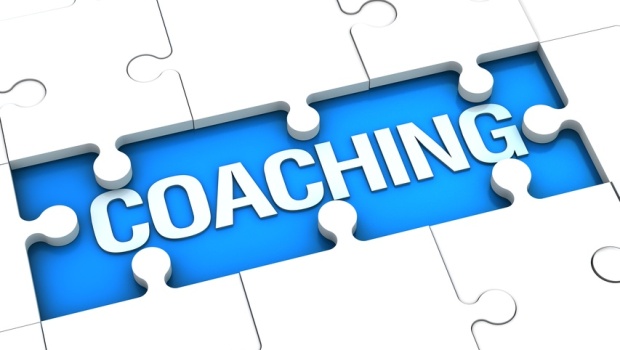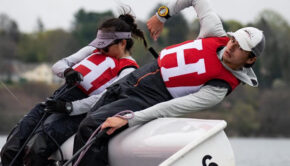Rod Davis: We coach people, not just sailing
Published on October 12th, 2014
 Two-time Olympic medallist Rod Davis, after being closely associated as a coach for Emirates Team New Zealand, is now gearing up for his ninth America’s Cup campaign with Artemis Racing. In a column for Seahorse magazine, Davis shares his trade secrets on effective coaching…
Two-time Olympic medallist Rod Davis, after being closely associated as a coach for Emirates Team New Zealand, is now gearing up for his ninth America’s Cup campaign with Artemis Racing. In a column for Seahorse magazine, Davis shares his trade secrets on effective coaching…
Coaching… I used to think of coaching as teaching and passing on expertise. And it is to a point; but another, equally important obligation of the complete coach is to create an environment that ‘gets the very best out of their players’.
With time, my coaching style has progressed to include more than the technical aspects of racing sail boats. Call it the mental side of coaching. Just that word ‘mental’ will send shivers down the spines of most athletes, including me before I switched sides. So the smart play is to help the mental side along without the athletes, sailors in my case, ever knowing. The key thing to remember is: we coach people, not just sailing.
Here are some tricks and tips of that aspect of the coaching world, that I use in coaching sail boat racing teams, mostly established teams, that simply want to be the best they can be. These concepts can be used any time you’re looking for an increase of performance be it at work, school, or in sport. In sail boat coaching you tend to deal with say, a dozen people or less, more often less. So these tips are tailored for that situation.
Before I give away my trade secrets, let’s spend a moment to reflect upon what ‘we’, as coaches, are trying to accomplish. In the sailing world, coaches remain a wee bit controversial, being seen as another step in the armaments’ war. New sails, bottom job, support boats, coaches, some say just more expense and where does it all end?
Some feel it’s a bit on the nose to have someone measure the current for you, bring out the lunch, carry spare sails or tow the race boat on and off the race course. But that is not the role of the coach, that is just a sideline.
Meanwhile the regatta authorities are generally pretty happy to have the coaches, even it they don’t want to show it, because the coaches become the safety fleet if all hell should break lose. The coaches all know, and accept that responsibility. The art of coaching is much less mechanical; it’s more about out-thinking problems, rather than just doing things.
In coaching, in the total sense and with respect to the end goal: to get the best out of your sailors there are three main points:
1) Create an environment that motivates and lifts them, both as individuals and as a team.
2) Make an impact that makes them better than they were.
3) It has to be fun, on and off the water, for everyone. You know, a pleasurable, enjoyable experience.
Below are some of my tips to make it all happen…
Create an ego free environment. Coaching is not about telling the others how or what to do, and it’s definitely not about lecturing to the pupils. Direct answers or a directive from the outside rarely get the buy-in for lasting improvement. By contrast, answers that come from within the ‘family’ are implemented.
Take debriefings, for example… informal and relaxed, not an inquisition. More of an organized chat, to make sure that the sailors are relaxed with their defense shields in the down position, making everyone more open minded. Create a mind set that, ‘we are all sponges to soak up the collective knowledge and use it for our own personal and team good’.
Another simple set of rules for debriefs:
– Egos are checked at the door. We are all equals at a debrief. If you disagree with something, say so. But you have to say why. You have to back it up with logic. Not emotion, but objectivity. Finish with a plan of how we are going to improve tomorrow, with names and responsibilities
– My job, as the coach, is to keep the debrief moving along, sometimes guiding the conversations, sometimes not. Operating under the same rules and terms that everyone is living by. Mind you we are not here for a talk fest, you’re here to debrief and learn. Like in rugby, a fast game is a good game. That is my job, keep it moving.
– Always respect the culture. Every established team has a culture, a style of operating that almost defines them. Some are loose, others are strung tighter than a banjo. Team New Zealand and Luna Rossa had very different cultures. Both are right, at least for them. All teams are different and have different buttons you push to get the best out of them. It’s not cookie cutter stuff, it’s a fact of life. Celebrate the cultural differences, take the time to understand them, respect them, don’t try and throw them out, but use the good points to advantage.
My Dutch Dragon team is as different as chalk and cheese to my American Melges 32 team. Both are top teams, both dedicated and they are both very very good. But I use different styles, respecting their differences.
It’s great fun to figure out, if you don’t, it will simply result in less effective coaching; I would go so far as to say lazy coaching, to just to use one formula of operating and coaching style.
If you are wondering, how can he be an ‘expert’ in Dragons, Melges 32s, and AC winged cats all at the same time, the short answer is that most often I don’t need to be. Collectively all the expertise and answers already exists within each of the individuals on those teams. I ask the questions that bring out that expertise.
For example, I do what I call ‘us and them’ pictures. This is our sail trim and this is the sail trim of one of the top boats in the class. ‘What are the differences and is that good or bad?’ It all ties in together to create buy-in.
Know what is important and what is not. That is where the experience of the coach really comes in. Identifying what will make an impact and what are the time wasters. You can spend hours and hours on things that don’t or won’t have in impact. There are many factors to consider: strengths and weakness of the sailors and team, the competition; perhaps the most important is the time available to prepare. Balancing time with impact is all important. As you already know, each situation and program are different. Being at arms length is an advantage in this respect. You can see the forest from the trees.
Use your time on the water well, really, really well. Be super efficient, going from one job or drill to the next. Wasting time is a mental killer for a sailing team. It destroys motivation.
It is OK to spend less time on the water if you rip into the work. Get it done and go home. Four hours of quick pace action is plenty to go over later. Sailors, people in general, are better at collecting information than they are at using it; less time collecting and more time thinking how best to use it won’t go amiss anyway.
Coaches know, or should know that effective coaching is not about being ‘seen’ as the coach. In fact when you do coaching really well, you spend much of your time behind the scenes, making things just happen. As if by magic. If the coach can do that and stay invisible, well that is the gold medal of coaching.
In the end, it’s like practicing psychology without a license, but with years of experience of what works and what doesn’t. It’s based around the sailors, stimulating their motivation, trust, and desire to be the best they can be. That is not just a sailing, work or school thing, that is life. That is all it is.
NOTE: This column was re-published with permission from Seahorse magazine. Information about Seahorse can be found HERE.









 We’ll keep your information safe.
We’ll keep your information safe.